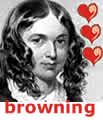"Who so loves/Believes the impossible." ~ Elizabeth Barrett Browning
Poet Elizabeth Barrett Browning (1806-1861) was born in Durham, England on this day, the first of 12 children.
At age 10 she said, "I read that I might write" and aspired to be the female counterpart of Homer or Lord Byron.
Known for her Sonnets from the Portuguese (1850), her poetry captured the essence of her love for poet Robert Browning.
The 43rd sonnet began with the famous words, "How do I love thee? Let me count the ways." The book's title came from Robert's pet name for Elizabeth, "the Portuguese."
"Experience, like a pale musician," she wrote, "holds a dulcimer of patience in his hand."
With patience and love, Elizabeth and Robert believed-- and created-- the "impossible." Through the beauty of her poetry, Robert fell in love with her before they ever met. He wrote to her of his admiration and she replied.
The couple exchanged nearly 600 letters and poetry for 20 months. Of their love, she wrote, "He made me feel with every breath I drew in his presence, that he loved me with no ordinary affection."
Elizabeth, an invalid and recluse with a chronic lung disease, chose love over death. She defied her father's orders, and the couple eloped to Italy in 1846 where they flourished in their love for one another.
"Grow old along with me!" Robert urged his beloved in one of his most famous poems, "The best is yet to be./The last of life, for which the first was made."

